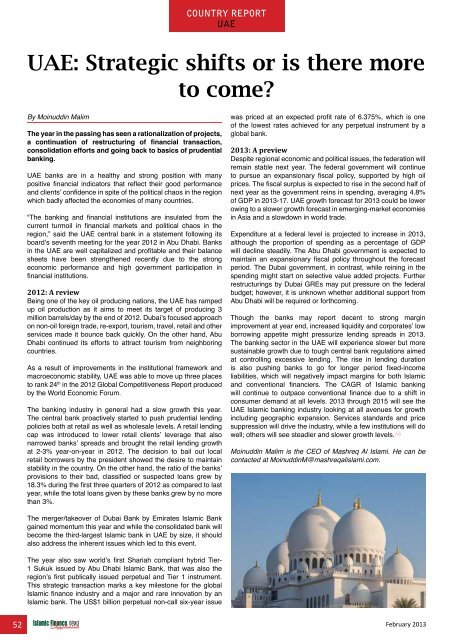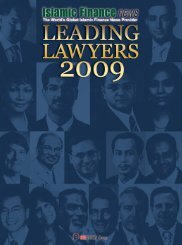View PDF Edition - Islamic Finance News
View PDF Edition - Islamic Finance News
View PDF Edition - Islamic Finance News
You also want an ePaper? Increase the reach of your titles
YUMPU automatically turns print PDFs into web optimized ePapers that Google loves.
country report<br />
UAE<br />
UAE: Strategic shifts or is there more<br />
to come?<br />
By Moinuddin Malim<br />
The year in the passing has seen a rationalization of projects,<br />
a continuation of restructuring of financial transaction,<br />
consolidation efforts and going back to basics of prudential<br />
banking.<br />
UAE banks are in a healthy and strong position with many<br />
positive financial indicators that reflect their good performance<br />
and clients’ confidence in spite of the political chaos in the region<br />
which badly affected the economies of many countries.<br />
“The banking and financial institutions are insulated from the<br />
current turmoil in financial markets and political chaos in the<br />
region,” said the UAE central bank in a statement following its<br />
board’s seventh meeting for the year 2012 in Abu Dhabi. Banks<br />
in the UAE are well capitalized and profitable and their balance<br />
sheets have been strengthened recently due to the strong<br />
economic performance and high government participation in<br />
financial institutions.<br />
2012: A review<br />
Being one of the key oil producing nations, the UAE has ramped<br />
up oil production as it aims to meet its target of producing 3<br />
million barrels/day by the end of 2012. Dubai’s focused approach<br />
on non-oil foreign trade, re-export, tourism, travel, retail and other<br />
services made it bounce back quickly. On the other hand, Abu<br />
Dhabi continued its efforts to attract tourism from neighboring<br />
countries.<br />
As a result of improvements in the institutional framework and<br />
macroeconomic stability, UAE was able to move up three places<br />
to rank 24 th in the 2012 Global Competitiveness Report produced<br />
by the World Economic Forum.<br />
The banking industry in general had a slow growth this year.<br />
The central bank proactively started to push prudential lending<br />
policies both at retail as well as wholesale levels. A retail lending<br />
cap was introduced to lower retail clients’ leverage that also<br />
narrowed banks’ spreads and brought the retail lending growth<br />
at 2-3% year-on-year in 2012. The decision to bail out local<br />
retail borrowers by the president showed the desire to maintain<br />
stability in the country. On the other hand, the ratio of the banks’<br />
provisions to their bad, classified or suspected loans grew by<br />
18.3% during the first three quarters of 2012 as compared to last<br />
year, while the total loans given by these banks grew by no more<br />
than 3%.<br />
was priced at an expected profit rate of 6.375%, which is one<br />
of the lowest rates achieved for any perpetual instrument by a<br />
global bank.<br />
2013: A preview<br />
Despite regional economic and political issues, the federation will<br />
remain stable next year. The federal government will continue<br />
to pursue an expansionary fiscal policy, supported by high oil<br />
prices. The fiscal surplus is expected to rise in the second half of<br />
next year as the government reins in spending, averaging 4.8%<br />
of GDP in 2013-17. UAE growth forecast for 2013 could be lower<br />
owing to a slower growth forecast in emerging-market economies<br />
in Asia and a slowdown in world trade.<br />
Expenditure at a federal level is projected to increase in 2013,<br />
although the proportion of spending as a percentage of GDP<br />
will decline steadily. The Abu Dhabi government is expected to<br />
maintain an expansionary fiscal policy throughout the forecast<br />
period. The Dubai government, in contrast, while reining in the<br />
spending might start on selective value added projects. Further<br />
restructurings by Dubai GREs may put pressure on the federal<br />
budget; however, it is unknown whether additional support from<br />
Abu Dhabi will be required or forthcoming.<br />
Though the banks may report decent to strong margin<br />
improvement at year end, increased liquidity and corporates’ low<br />
borrowing appetite might pressurize lending spreads in 2013.<br />
The banking sector in the UAE will experience slower but more<br />
sustainable growth due to tough central bank regulations aimed<br />
at controlling excessive lending. The rise in lending duration<br />
is also pushing banks to go for longer period fixed-income<br />
liabilities, which will negatively impact margins for both <strong>Islamic</strong><br />
and conventional financiers. The CAGR of <strong>Islamic</strong> banking<br />
will continue to outpace conventional finance due to a shift in<br />
consumer demand at all levels. 2013 through 2015 will see the<br />
UAE <strong>Islamic</strong> banking industry looking at all avenues for growth<br />
including geographic expansion. Services standards and price<br />
suppression will drive the industry, while a few institutions will do<br />
consulting www.<strong>Islamic</strong><strong>Finance</strong>Consulting.com<br />
www.<strong>Islamic</strong><strong>Finance</strong>Events.com<br />
well; others will see steadier and slower growth levels.<br />
www.<strong>Islamic</strong><strong>Finance</strong><strong>News</strong>.com<br />
www.<strong>Islamic</strong><strong>Finance</strong>Training.com<br />
www.MIFforum.com<br />
www.MIFmonthly.com<br />
www.MIFtraining.com<br />
www.REDmoneyBooks.com<br />
Moinuddin Malim is the CEO of Mashreq Al Islami. He can be<br />
contacted at MoinuddinM@mashreqalislami.com.<br />
The merger/takeover of Dubai Bank by Emirates <strong>Islamic</strong> Bank<br />
gained momentum this year and while the consolidated bank will<br />
become the third-largest <strong>Islamic</strong> bank in UAE by size, it should<br />
also address the inherent issues which led to this event.<br />
The year also saw world’s first Shariah compliant hybrid Tier-<br />
1 Sukuk issued by Abu Dhabi <strong>Islamic</strong> Bank, that was also the<br />
region’s first publically issued perpetual and Tier 1 instrument.<br />
This strategic transaction marks a key milestone for the global<br />
<strong>Islamic</strong> finance industry and a major and rare innovation by an<br />
<strong>Islamic</strong> bank. The US$1 billion perpetual non-call six-year issue<br />
52 February 2013
















